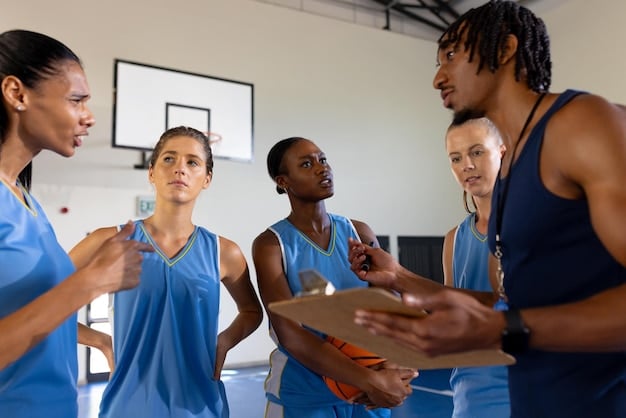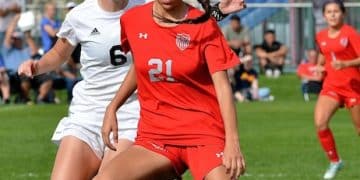College Recruiting Timeline: A Guide for High School Athletes

Understanding the College Recruiting Process for High School Athletes: A Timeline for Success is a comprehensive guide that outlines the steps high school athletes need to take from freshman year through senior year to maximize their chances of being recruited by college teams.
Navigating the college recruiting landscape can feel overwhelming for high school athletes. That’s why understanding the College Recruiting Process for High School Athletes: A Timeline for Success is crucial – it breaks down the complex process into manageable steps, helping you stay on track and increase your chances of playing at the next level.
Freshman and Sophomore Years: Building a Foundation
The early years of high school are crucial for laying the groundwork for college recruitment. While it may seem early to start thinking about college, these years are the perfect time to focus on academic and athletic development.
Academic Excellence
Colleges look for well-rounded students, and academics are a significant part of the equation. Start strong and maintain good grades from the beginning. This not only opens doors to more colleges but also provides a solid foundation for future academic success.
Skill Development
Focus on improving your athletic skills. Attend camps, clinics, and training sessions to enhance your abilities. Work closely with your high school coaches to identify areas for improvement and create a plan for development.

During this period, you can also consider exploring different sports and positions to find the best fit. Experimenting with different activities will develop your overall athletic capabilities. This can make you a more versatile and appealing candidate for college teams.
- Maintain a High GPA: Aim for excellent grades in all your classes.
- Join Clubs and Activities: Diversify your extracurricular profile.
- Attend Sport-Specific Camps: Improve your skills in your chosen sport.
- Set Athletic Goals: Define what you want to achieve in high school.
By focusing on academics and skill development during your freshman and sophomore years, you are setting yourself up for success in the college recruiting process. This proactive approach will make you a more attractive candidate for college coaches and recruiters.
Junior Year: Stepping Up Your Game
Junior year is when the college recruiting process starts to intensify. This year is critical for actively engaging with college coaches, showcasing your abilities, and narrowing down your college choices. Develop a strategic plan to proactively navigate the recruiting landscape.
Create an Athletic Resume
An athletic resume is a comprehensive summary of your athletic achievements, academic record, and contact information. Include key statistics, awards, and accomplishments that highlight your abilities. Make sure your resume is well-organized and easy to read.
Film and Share Your Highlights
College coaches often rely on game footage to evaluate potential recruits. Create a highlight reel that showcases your best plays and skills. Share this reel with coaches via email or through online recruiting platforms. Having a professional-quality video can significantly increase your visibility.
Participate in showcases and tournaments where college coaches will be present. These events provide opportunities to compete against top talent and demonstrate your abilities to college recruiters. Ensure you perform at your best and make a lasting impression.
- Update Your Athletic Resume: Include recent achievements and statistics.
- Create a Highlight Reel: Showcase your best plays in a concise video.
- Attend Showcases and Tournaments: Compete in front of college coaches.
- Contact College Coaches: Express your interest and share your resume and video.
Junior year is all about visibility and actively pursuing college opportunities. By creating a strong athletic resume, showcasing your skills through video, and competing in front of college coaches, you can elevate your recruiting profile and increase your chances of receiving offers.
Summer Before Senior Year: Intensive Engagement
The summer before your senior year is a prime time for intensive engagement with college coaches. Many college programs host summer camps, clinics, and showcases designed to evaluate potential recruits. Actively participate in these events to make a strong impression.

Attend college summer camps to experience the college environment and interact with coaches and players. These camps offer a valuable opportunity to showcase your skills and get a feel for the program’s culture and coaching style. Engage actively and seek feedback to improve your performance.
Official and Unofficial Visits
Plan official and unofficial visits to colleges that interest you. An official visit is funded by the college, while an unofficial visit is self-funded. Use these visits to tour the campus, meet coaches and players, and get a better understanding of the college’s academic and athletic programs. Prepare a list of questions to ask and take detailed notes on your impressions.
NCAA Eligibility Center
Register with the NCAA Eligibility Center to ensure you meet the academic requirements for college athletics. Submit your transcripts and test scores to determine your eligibility status. Staying compliant with NCAA regulations is essential for receiving athletic scholarships.
- Attend College Summer Camps: Showcase your skills and experience the college environment.
- Schedule Official and Unofficial Visits: Explore colleges and meet coaches.
- Register with the NCAA Eligibility Center: Ensure you meet academic requirements.
- Follow Up with Coaches: Maintain regular communication and express your interest.
The summer before senior year is a period of intensive evaluation and engagement. Take advantage of every opportunity to showcase your abilities, learn about different college programs, and establish strong relationships with college coaches. This proactive approach can significantly influence your recruiting outcomes.
Senior Year: Making Your Decision
Senior year is when you solidify your college decision and prepare for the next chapter. This year involves weighing your options, making informed choices, and finalizing your commitment to a college program. Maintain your focus both academically and athletically during this critical time.
Evaluate Scholarship Offers
Carefully evaluate any scholarship offers you receive. Compare the financial aid packages, academic support, and athletic opportunities offered by each college. Consider the long-term benefits of each institution and choose the offer that best aligns with your academic and athletic goals.
Commit to a College
Once you have evaluated your options, make a commitment to the college that feels like the best fit. Inform all other colleges of your decision and express your gratitude for their interest. Solidify your commitment by signing a National Letter of Intent (NLI), which is a binding agreement between you and the college.
Maintain Performance
Continue to perform at your best both academically and athletically throughout your senior year. Stay focused on your studies to maintain your GPA and excel in your classes. Work hard in your sport to improve your skills and contribute to your team’s success. Colleges will continue to monitor your progress, so consistency is key.
Continue to communicate with your future college coaches and stay updated on any team activities or requirements. Develop a plan to transition smoothly into college life, including academics, athletics, and social integration. Seek mentorship from upperclassmen or alumni to ease your transition.
- Evaluate Scholarship Offers: Compare financial aid packages and academic support.
- Commit to a College: Make your decision and inform all parties involved.
- Sign a National Letter of Intent (NLI): Solidify your commitment.
- Maintain Performance: Excel academically and athletically.
Senior year is about making informed decisions and preparing for your collegiate career. By carefully evaluating scholarship offers, committing to the right college, and maintaining your performance, you can set a strong foundation for success in college athletics. Celebrate your achievements and look forward to the challenges and opportunities that lie ahead.
Ongoing Strategies for Success
Throughout the college recruiting process, there are several ongoing strategies that can enhance your chances of success. These strategies involve effective communication, proactive engagement, and continuous self-improvement. Implement these tactics consistently to maximize your recruiting potential.
Effective Communication
Maintain clear and professional communication with college coaches. Respond promptly to emails and phone calls, and express your interest in their programs. Show genuine enthusiasm and be respectful in all your interactions. Building positive relationships with coaches can significantly influence their perception of you.
Use Social Media Wisely
Be mindful of your social media presence. College coaches often review social media profiles to assess a recruit’s character and behavior. Ensure your social media accounts reflect positively on you and showcase your accomplishments. Avoid posting anything that could be perceived as negative, inappropriate, or unprofessional.
Continually work on improving your athletic skills. Seek feedback from coaches and trainers, and dedicate time to targeted practice and development. Colleges look for athletes who demonstrate a commitment to self-improvement and a strong work ethic. Continuous improvement can set you apart from other recruits.
- Maintain Clear Communication: Respond promptly and professionally to coaches.
- Use Social Media Wisely: Ensure your online presence reflects positively on you.
- Continuously Improve Your Skills: Dedicate time to targeted practice and development.
- Seek Mentorship: Learn from experienced athletes and coaches.
Sustained effort and a proactive mindset are key to navigating the college recruiting process successfully. By maintaining effective communication, using social media wisely, focusing on continuous improvement, and seeking mentorship, you can optimize your recruiting outcomes and increase your chances of achieving your collegiate athletic goals.
| Key Action | Brief Description |
|---|---|
| 🎓 Academic Prep | Focus on grades and NCAA eligibility early. |
| 🎥 Highlight Reel | Create video showcasing your best athletic plays. |
| 📧 Coach Outreach | Directly contact college coaches with resume/video. |
| 🤝 College Visits | Visit campuses for deeper insights and networking. |
Frequently Asked Questions (FAQ)
▼
Ideally, you should start thinking about college recruitment during your freshman year. Focus on academics and athletic development from the beginning to build a strong foundation.
▼
Academics are very important. Colleges look for well-rounded students, and a strong GPA can open doors to more opportunities and scholarships. Meeting NCAA eligibility requirements is crucial.
▼
Your athletic resume should include your contact information, academic record, athletic statistics, awards, accomplishments, and any relevant experience in camps, clinics, or tournaments.
▼
Showcase your best plays and skills in a concise video. Focus on quality over quantity, and ensure the video is well-edited and easy to watch. Highlight your strengths and key attributes.
▼
The National Letter of Intent (NLI) is a binding agreement between you and a college, indicating your commitment to attend and participate in their athletic program. It comes with specific obligations and considerations.
Conclusion
Understanding the College Recruiting Process for High School Athletes: A Timeline for Success requires a strategic approach, beginning early in your high school career, staying proactive, and continually improving. By focusing on academics, athletic skill development, and effective communication, you can successfully navigate the recruiting landscape and achieve your dream of playing college sports.





